And if Boeing had a ah neh ceo, all these would not happen. First it was with max, now its with dreamliner.
AIRLINES
Congressional report faults Boeing, FAA for 737 Max failures, just as regulators close in on recertification
PUBLISHED WED, SEP 16 20205:00 AM EDTUPDATED WED, SEP 16 202011:12 AM EDT
Leslie Josephs@LESLIEJOSEPHS
KEY POINTS
VIDEO01:46
Congressional report details missteps by Boeing in 737 Max development
Numerous design, management and regulatory failures during the development of the 737 Max preceded the “preventable death” of 346 people in two crashes of the popular Boeing jetliner, according to a damning congressional report released Wednesday.
The House Committee on Transportation and Infrastructure’s 238-page report, put together by its Democratic leaders and their staff, painted a Boeing that prioritized profits over safety and detailed “disturbing cultural issues” relating to employee surveys showing some experienced “undue pressure” as the manufacturer raced to finish the plane to compete with rival Airbus. The report said concerns about the aircraft weren’t sufficiently addressed to spur design changes.
Some bipartisan lawmakers this year introduced legislation that aims to increase the Federal Aviation Administration’s oversight of the industry. The lawmakers found the FAA failed to protect the traveling public, in part because of “excessive” delegation of certification work to Boeing.
Responding to the report, the agency said: “The FAA is committed to continually advancing aviation safety and looks forward to working with the Committee to implement improvements identified in its report.” It said it has implemented several initiatives “focused on advancing overall aviation safety by improving our organization, processes, and culture.”
High-ranking Republicans on the House committee — Reps. Sam Graves of Missouri and Garret Graves of Louisiana — said in a statement that nonpartisan recommendations “not a partisan investigative report — should serve as the basis for Congressional action.” Garret Graves is the ranking Republican on the aviation subcommittee. Sam Graves’ home state counts Boeing as a major employer.
“The Majority staff’s investigation began by concluding that our system was broken and worked backwards from there,” the congressmen said.
“As we have said from the beginning, if aviation and safety experts determine that areas in the FAA’s processes for certifying aircraft and equipment can be improved, then Congress will act,” they added. “That’s how we can address these two tragic accidents and make our safe system even safer.”
The report, in the works for about 18 months, comes as regulators are in the final stretch of work to recertify the planes. The 737 Max has been grounded worldwide since March 2019, following the second of the planes’ two fatal crashes.
“They were the horrific culmination of a series of faulty technical assumptions by Boeing’s engineers, a lack of transparency on the part of Boeing’s management, and grossly insufficient oversight by the FAA — the pernicious result of regulatory capture on the part of the FAA with respect to its responsibilities to perform robust oversight of Boeing and to ensure the safety of the flying public,” the report said. The lawmakers and staff said they received 600,000 pages of records from Boeing, the FAA, airlines and others, for its investigation, conducted interviews with two dozen employees and regulators, and considered comments from whistleblowers who reached out to the committee.
On Oct. 29, 2018, Lion Air Flight 610 from Jakarta, Indonesia, and on March 10, 2019, Ethiopian Airlines Flight 302 from Addis Ababa, Ethiopia, crashed shortly after takeoff, killing everyone on board. At the center of the crashes was an automated system known as MCAS, against which pilots for both flights battled to override. It was activated after receiving inaccurate sensor data.
Pilots were not informed of MCAS until after the first crash and mentions of it were removed from their manuals. Last year, the National Transportation Safety Board found Boeing overestimated pilots’ ability to handle a flurry of alerts during malfunctions.
Boeing has made changes to the MCAS system that render it less powerful, give pilots greater control and provide it with more data before it is activated. That is among other changes regulators have reviewed as part of the process in recertifying the planes as safe for the traveling public.
“We have learned many hard lessons as a company from the accidents of Lion Air Flight 610 and Ethiopian Flight 302, and from the mistakes we have made,” Boeing said in a statement. “As this report recognizes, we have made fundamental changes to our company as a result, and continue to look for ways to improve. Change is always hard and requires daily commitment, but we as a company are dedicated to doing the work.”
The House report, led by Rep. Peter DeFazio, D-Ore., the committee chair, and Rep. Rick Larsen, D-Wash., head of the aviation subcommittee, whose Seattle-area district includes Boeing’s Everett plant, said its investigation “leaves open the question of Boeing’s willingness to admit to and learn from the company’s mistakes.”
Some of crash victims’ family members say Boeing has not done enough.
“I think the project as a whole should be scrapped,” said Yalena Lopez-Lewis, whose husband, Antoine, was killed on the Ethiopian Airlines flight. “I think this was a rushed project and ... now they’re rushing to recertify. You can’t place a dollar value on the lives of any passenger.”
Michael Stumo, whose daughter Samya Stumo also was killed in the Ethiopian crash, said Boeing and regulators didn’t do enough after the first crash five months earlier.
“Before Lion Air, it was a mistake. After Lion Air it was unforgivable,” he said.
The crashes pushed Boeing into its biggest-ever crisis, as its bestselling aircraft couldn’t be delivered to customers and costs mounted. The missteps cost Dennis Muilenburg his job as Boeing CEO and prompted the company to undergo an internal restructuring to improve its approach to safety. Now, the coronavirus pandemic that has roiled air travel demand worldwide coupled with the extensive grounding presents Boeing with a new problem: cancellations of the planes are piling up.
The manufacturer’s problems don’t end with the 737 Max. It recently discovered flaws on some 787 Dreamliners, prompting inspections that have slowed deliveries of the wide-body aircraft.
Boeing grounds eight 787 Dreamliners over manufacturing flaw


By Chris Isidore and Pete Muntean, CNN
Updated 1604 GMT (0004 HKT) August 28, 2020
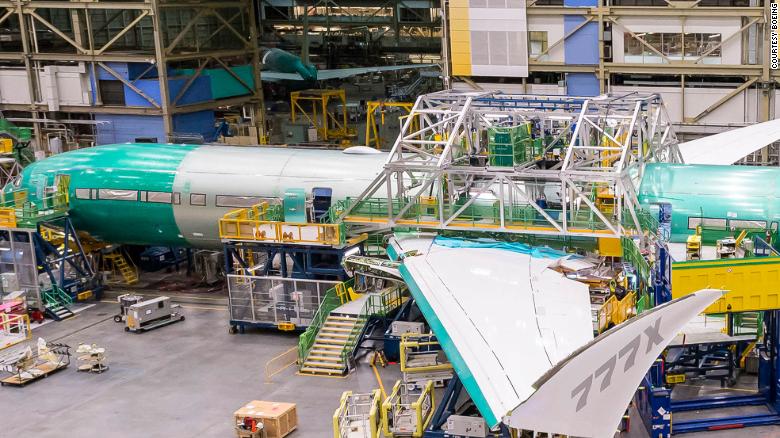
Airlines push to get people flying again
Why budget airlines could see big changes post pandemic
Southwest Airlines CEO: I'm far more optimistic than Warren Buffett
Lufthansa seeks government aid amidst pandemic
Major US airlines to require passengers to wear face masks
How the pandemic is changing the way we fly
Boeing may be down. It's definitely not out
Here's how Boeing and Airbus became a duopoly
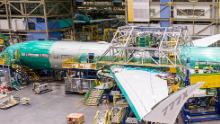
Boeing to cut jobs in response to coronavirus crisis
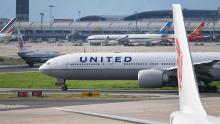
United Airlines Chair: What the airline industry is facing is dire
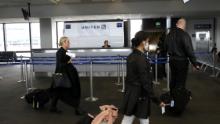
United, American and Delta drop change fees
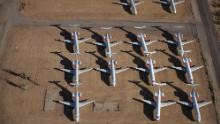
American Airlines suspends service to 15 cities
Southwest Airlines CEO: We still don't have enough testing
Delta CEO: Our goal is to restore confidence in air travel
Airbus to cut 15,000 jobs
Airlines push to get people flying again
Why budget airlines could see big changes post pandemic
Southwest Airlines CEO: I'm far more optimistic than Warren Buffett
Lufthansa seeks government aid amidst pandemic
Major US airlines to require passengers to wear face masks
How the pandemic is changing the way we fly
Boeing may be down. It's definitely not out
Here's how Boeing and Airbus became a duopoly

Boeing to cut jobs in response to coronavirus crisis

United Airlines Chair: What the airline industry is facing is dire

United, American and Delta drop change fees

American Airlines suspends service to 15 cities
Southwest Airlines CEO: We still don't have enough testing
Delta CEO: Our goal is to restore confidence in air travel
Airbus to cut 15,000 jobs
Airlines push to get people flying again
New York (CNN Business)Boeing has found a problem with the manufacturing of the 787 Dreamliner, the widebody jet that is one of the most successful products of the troubled aircraft maker.
Eight of the planes will be grounded for inspection and repair of how parts of the fuselage were joined together, Boeing said in a statement.
"Boeing has identified two distinct manufacturing issues in the join of certain 787 aftbody fuselage sections, which, in combination, result in a condition that does not meet our design standards," said the company's statement. It said it is conducting a thorough review into the root cause of the problem.
There are nearly 1,000 787s that have been delivered to 69 different airlines worldwide since it started operations in 2012.
Boeing would not identify the three airlines that own the planes that were grounded for inspections. The aviation news site The Air Current, which broke the news, reports that United (UAL), Air Canada (ACDVF) and Singapore Airlines own the eight planes.
Spokespeople for United and Singapore confirmed that each airline had one of the eight affected planes in its fleet. Both airlines said the affected planes were not in service when the problem was discovered. Most of the widebody jets worldwide have been grounded due to the Covid-19 pandemic. Air Canada did not immediately respond to a request for comment. It has 37 Dreamliners overall in its fleet.
Boeing is already struggling with problems with its best-selling plane, the single-aisle 737 Max, which has been grounded since March 2019 following two fatal crashes that killed 346 people. It is still awaiting approval for that plane to fly again.
The Federal Aviation Administration says it is aware of the problem with the 787 and "continues to engage with Boeing," but aviation regulators did not say whether they plan to issue a safety bulletin to operators about the issue. Boeing says the FAA has been "fully briefed, and we will continue to work closely with them going forward."
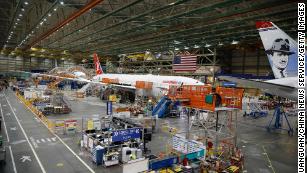
Boeing plans more job cuts on top of 16,000 announced this spring
The 787 Dreamliner is a leading aircraft in the widebody portion of the market, in which Boeing dominates rival Airbus (EADSF). Made of composite material that weighs less than aluminum, the jet is extremely fuel-efficient. While it was briefly grounded in 2013 following some fires in its lithium battery, the plane has had few known problems since then.
But the plane is primarily used on longer international routes, and international air travel has been severely curtailed by the Covid-19 pandemic.
Boeing has announced it would slow production of the Dreamliner as a result of the pandemic, and said it is considering closing one of the two plants that build the plane to consolidate operations and cut costs. One plant, in Washington state, has union-represented workers, while the workers at the plant in South Carolina are not represented by a union.
A Boeing spokesman could not immediately say whether the manufacturing problems related to both plants or only one.
Shares of Boeing (BA) were little changed in morning trading Friday.
AIRLINES
Congressional report faults Boeing, FAA for 737 Max failures, just as regulators close in on recertification
PUBLISHED WED, SEP 16 20205:00 AM EDTUPDATED WED, SEP 16 202011:12 AM EDT
Leslie Josephs@LESLIEJOSEPHS
KEY POINTS
- The House committee’s report detailed multiple missteps by Boeing and the FAA in the development and approval of the 737 Max.
- The 238-page report outlined design flaws and immense pressure on employees amid competition from rival Airbus.
- The lawmakers found the FAA failed to protect the traveling public, in part because of “excessive” delegation of certification work to Boeing.
- The results of the investigation were released as regulators are getting closer to recertifying the planes.
VIDEO01:46
Congressional report details missteps by Boeing in 737 Max development
Numerous design, management and regulatory failures during the development of the 737 Max preceded the “preventable death” of 346 people in two crashes of the popular Boeing jetliner, according to a damning congressional report released Wednesday.
The House Committee on Transportation and Infrastructure’s 238-page report, put together by its Democratic leaders and their staff, painted a Boeing that prioritized profits over safety and detailed “disturbing cultural issues” relating to employee surveys showing some experienced “undue pressure” as the manufacturer raced to finish the plane to compete with rival Airbus. The report said concerns about the aircraft weren’t sufficiently addressed to spur design changes.
Some bipartisan lawmakers this year introduced legislation that aims to increase the Federal Aviation Administration’s oversight of the industry. The lawmakers found the FAA failed to protect the traveling public, in part because of “excessive” delegation of certification work to Boeing.
Responding to the report, the agency said: “The FAA is committed to continually advancing aviation safety and looks forward to working with the Committee to implement improvements identified in its report.” It said it has implemented several initiatives “focused on advancing overall aviation safety by improving our organization, processes, and culture.”
High-ranking Republicans on the House committee — Reps. Sam Graves of Missouri and Garret Graves of Louisiana — said in a statement that nonpartisan recommendations “not a partisan investigative report — should serve as the basis for Congressional action.” Garret Graves is the ranking Republican on the aviation subcommittee. Sam Graves’ home state counts Boeing as a major employer.
“The Majority staff’s investigation began by concluding that our system was broken and worked backwards from there,” the congressmen said.
“As we have said from the beginning, if aviation and safety experts determine that areas in the FAA’s processes for certifying aircraft and equipment can be improved, then Congress will act,” they added. “That’s how we can address these two tragic accidents and make our safe system even safer.”
The report, in the works for about 18 months, comes as regulators are in the final stretch of work to recertify the planes. The 737 Max has been grounded worldwide since March 2019, following the second of the planes’ two fatal crashes.
“They were the horrific culmination of a series of faulty technical assumptions by Boeing’s engineers, a lack of transparency on the part of Boeing’s management, and grossly insufficient oversight by the FAA — the pernicious result of regulatory capture on the part of the FAA with respect to its responsibilities to perform robust oversight of Boeing and to ensure the safety of the flying public,” the report said. The lawmakers and staff said they received 600,000 pages of records from Boeing, the FAA, airlines and others, for its investigation, conducted interviews with two dozen employees and regulators, and considered comments from whistleblowers who reached out to the committee.
On Oct. 29, 2018, Lion Air Flight 610 from Jakarta, Indonesia, and on March 10, 2019, Ethiopian Airlines Flight 302 from Addis Ababa, Ethiopia, crashed shortly after takeoff, killing everyone on board. At the center of the crashes was an automated system known as MCAS, against which pilots for both flights battled to override. It was activated after receiving inaccurate sensor data.
Pilots were not informed of MCAS until after the first crash and mentions of it were removed from their manuals. Last year, the National Transportation Safety Board found Boeing overestimated pilots’ ability to handle a flurry of alerts during malfunctions.
Boeing has made changes to the MCAS system that render it less powerful, give pilots greater control and provide it with more data before it is activated. That is among other changes regulators have reviewed as part of the process in recertifying the planes as safe for the traveling public.
“We have learned many hard lessons as a company from the accidents of Lion Air Flight 610 and Ethiopian Flight 302, and from the mistakes we have made,” Boeing said in a statement. “As this report recognizes, we have made fundamental changes to our company as a result, and continue to look for ways to improve. Change is always hard and requires daily commitment, but we as a company are dedicated to doing the work.”
The House report, led by Rep. Peter DeFazio, D-Ore., the committee chair, and Rep. Rick Larsen, D-Wash., head of the aviation subcommittee, whose Seattle-area district includes Boeing’s Everett plant, said its investigation “leaves open the question of Boeing’s willingness to admit to and learn from the company’s mistakes.”
Some of crash victims’ family members say Boeing has not done enough.
“I think the project as a whole should be scrapped,” said Yalena Lopez-Lewis, whose husband, Antoine, was killed on the Ethiopian Airlines flight. “I think this was a rushed project and ... now they’re rushing to recertify. You can’t place a dollar value on the lives of any passenger.”
Michael Stumo, whose daughter Samya Stumo also was killed in the Ethiopian crash, said Boeing and regulators didn’t do enough after the first crash five months earlier.
“Before Lion Air, it was a mistake. After Lion Air it was unforgivable,” he said.
The crashes pushed Boeing into its biggest-ever crisis, as its bestselling aircraft couldn’t be delivered to customers and costs mounted. The missteps cost Dennis Muilenburg his job as Boeing CEO and prompted the company to undergo an internal restructuring to improve its approach to safety. Now, the coronavirus pandemic that has roiled air travel demand worldwide coupled with the extensive grounding presents Boeing with a new problem: cancellations of the planes are piling up.
The manufacturer’s problems don’t end with the 737 Max. It recently discovered flaws on some 787 Dreamliners, prompting inspections that have slowed deliveries of the wide-body aircraft.
Boeing grounds eight 787 Dreamliners over manufacturing flaw


By Chris Isidore and Pete Muntean, CNN
Updated 1604 GMT (0004 HKT) August 28, 2020

Airlines push to get people flying again
Why budget airlines could see big changes post pandemic
Southwest Airlines CEO: I'm far more optimistic than Warren Buffett
Lufthansa seeks government aid amidst pandemic
Major US airlines to require passengers to wear face masks
How the pandemic is changing the way we fly
Boeing may be down. It's definitely not out
Here's how Boeing and Airbus became a duopoly

Boeing to cut jobs in response to coronavirus crisis

United Airlines Chair: What the airline industry is facing is dire

United, American and Delta drop change fees

American Airlines suspends service to 15 cities
Southwest Airlines CEO: We still don't have enough testing
Delta CEO: Our goal is to restore confidence in air travel
Airbus to cut 15,000 jobs
Airlines push to get people flying again
Why budget airlines could see big changes post pandemic
Southwest Airlines CEO: I'm far more optimistic than Warren Buffett
Lufthansa seeks government aid amidst pandemic
Major US airlines to require passengers to wear face masks
How the pandemic is changing the way we fly
Boeing may be down. It's definitely not out
Here's how Boeing and Airbus became a duopoly

Boeing to cut jobs in response to coronavirus crisis

United Airlines Chair: What the airline industry is facing is dire

United, American and Delta drop change fees

American Airlines suspends service to 15 cities
Southwest Airlines CEO: We still don't have enough testing
Delta CEO: Our goal is to restore confidence in air travel
Airbus to cut 15,000 jobs
Airlines push to get people flying again
New York (CNN Business)Boeing has found a problem with the manufacturing of the 787 Dreamliner, the widebody jet that is one of the most successful products of the troubled aircraft maker.
Eight of the planes will be grounded for inspection and repair of how parts of the fuselage were joined together, Boeing said in a statement.
"Boeing has identified two distinct manufacturing issues in the join of certain 787 aftbody fuselage sections, which, in combination, result in a condition that does not meet our design standards," said the company's statement. It said it is conducting a thorough review into the root cause of the problem.
There are nearly 1,000 787s that have been delivered to 69 different airlines worldwide since it started operations in 2012.
Boeing would not identify the three airlines that own the planes that were grounded for inspections. The aviation news site The Air Current, which broke the news, reports that United (UAL), Air Canada (ACDVF) and Singapore Airlines own the eight planes.
Spokespeople for United and Singapore confirmed that each airline had one of the eight affected planes in its fleet. Both airlines said the affected planes were not in service when the problem was discovered. Most of the widebody jets worldwide have been grounded due to the Covid-19 pandemic. Air Canada did not immediately respond to a request for comment. It has 37 Dreamliners overall in its fleet.
Boeing is already struggling with problems with its best-selling plane, the single-aisle 737 Max, which has been grounded since March 2019 following two fatal crashes that killed 346 people. It is still awaiting approval for that plane to fly again.
The Federal Aviation Administration says it is aware of the problem with the 787 and "continues to engage with Boeing," but aviation regulators did not say whether they plan to issue a safety bulletin to operators about the issue. Boeing says the FAA has been "fully briefed, and we will continue to work closely with them going forward."

Boeing plans more job cuts on top of 16,000 announced this spring
The 787 Dreamliner is a leading aircraft in the widebody portion of the market, in which Boeing dominates rival Airbus (EADSF). Made of composite material that weighs less than aluminum, the jet is extremely fuel-efficient. While it was briefly grounded in 2013 following some fires in its lithium battery, the plane has had few known problems since then.
But the plane is primarily used on longer international routes, and international air travel has been severely curtailed by the Covid-19 pandemic.
Boeing has announced it would slow production of the Dreamliner as a result of the pandemic, and said it is considering closing one of the two plants that build the plane to consolidate operations and cut costs. One plant, in Washington state, has union-represented workers, while the workers at the plant in South Carolina are not represented by a union.
A Boeing spokesman could not immediately say whether the manufacturing problems related to both plants or only one.
Shares of Boeing (BA) were little changed in morning trading Friday.
